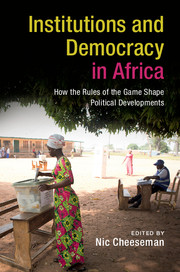Book contents
- Frontmatter
- Dedication
- Contents
- List of Figures
- List of Tables
- List of Contributors
- 1 Introduction: Understanding African Politics: Bringing the State Back In
- Part I Institutional Foundations
- Part II Law and Order
- Part III Elections, Parties and Political Competition
- Part IV Countervailing Institutions
- 12 The Legislature: Institutional Strengthening in Dominant-Party States
- 13 The Judiciary: Courts, Judges and the Rule of Law
- 14 Decentralisation: Accountability in Local Government
- 15 Conclusion: Political Institutions and Democracy in Africa: A Research Agenda
- Index
- References
14 - Decentralisation: Accountability in Local Government
from Part IV - Countervailing Institutions
Published online by Cambridge University Press: 05 February 2018
- Frontmatter
- Dedication
- Contents
- List of Figures
- List of Tables
- List of Contributors
- 1 Introduction: Understanding African Politics: Bringing the State Back In
- Part I Institutional Foundations
- Part II Law and Order
- Part III Elections, Parties and Political Competition
- Part IV Countervailing Institutions
- 12 The Legislature: Institutional Strengthening in Dominant-Party States
- 13 The Judiciary: Courts, Judges and the Rule of Law
- 14 Decentralisation: Accountability in Local Government
- 15 Conclusion: Political Institutions and Democracy in Africa: A Research Agenda
- Index
- References
Summary
African presidents have historically controlled politics on the continent through highly centralised states, a situation that is enshrined in around 80 per cent of African constitutions (Kuperman 2015). But in the past several decades, various reforms have sought to decentralise African states and transfer both power and resources from central governments to subnational ones. Some policymakers, development agencies, civil society organisations and academics advocate for such reforms in the hope that they will realise a number of benefits, including reducing local and national conflict, alleviating poverty, creating greater efficiency in service delivery, enhancing public participation and more generally deepening democracy (Crawford and Hartmann 2008; Dickovick and Riedl 2010).
But scholars of decentralised political institutions in Africa and the broader developing world are divided about whether such institutions in the majority of cases work as intended or, indeed, work against these goals. In the ideal case, decentralised governments are more responsive to their citizens, more aware of their needs, better at delivering services and more capable of collecting taxes. However, there are a number of barriers to decentralisation that can impede these gains or even exacerbate the problems that decentralisation sought to resolve (Crawford and Hartmann 2008).
This chapter focuses on the question of when, and why, decentralisation fulfils its promise to enhance local accountability. In some cases, decentralisation may increase accountability, but in others it can lead to minimal change or simply the transfer of corrupt practices from national to local governments (Crawford and Hartmann 2008). The existing literature highlights a number of factors that shape the quality of accountability in devolved systems, such as the strength of citizens and civil society (Sisk 2001), and the extent of local elite and political usurpation of newly decentralised institutions (Wunsch 2001, 2014). This process of capture is said to impede accountability, by directing the efforts of decentralised institutions away from the local interests towards the interests of national or local elites. Thus, informal practices of patronage undermine the process of strengthening formal institutions.
While acknowledging these factors, drawing on the experience of Kenya I demonstrate the potential of decentralisation for strengthening ties of local accountability. Following the introduction of the 2010 constitution, and the subsequent election of forty-seven new county governments in 2013, Kenya presents an important case for exploring how devolution can be used to enhance accountability in the African context.
- Type
- Chapter
- Information
- Institutions and Democracy in AfricaHow the Rules of the Game Shape Political Developments, pp. 327 - 350Publisher: Cambridge University PressPrint publication year: 2018
References
- 3
- Cited by



